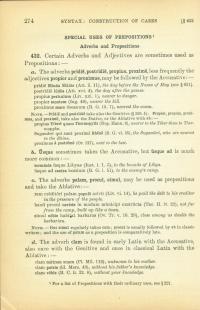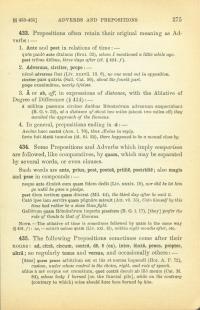432. Certain adverbs and adjectives are sometimes used as prepositions.1
a. The adverbs prīdiē, postrīdiē, propius, proximē, less frequently the adjectives propior and proximus, may be followed by the accusative.
prīdiē Nōnās Mâiās (Att. 2.11)
the day before the Nones of May (see § 631)
postrīdiē lūdōs (Att. 16.4)
the day after the games
propius perīculum (Liv. 21.1)
nearer to danger
propior montem (Iug. 49)
nearer the hill
proximus mare ōceanum (B. G. 3.7)
nearest the ocean
Note— Prīdiē and postrīdiē take also the genitive (§ 359.b). Propior, propius, proximus, and proximē, take also the dative, or the ablative with ab.
propius Tiberīquam Thermopylīs (Nep. Hann. 8)
nearer to the Tiber than to Thermopylæ
Sugambrī quī sunt proximī Rhēnō (B. G. 6.35)
the Sugambri, who are nearest to the Rhine
proximus ā postrēmō (Or. 217)
next to the last
b. Ūsque sometimes takes the accusative, but ūsque ad is much more common.
terminōs ūsque Libyae (Iust. 1.1.5)
to the bounds of Libya
ūsque ad castra hostium (B. G. 1.51)
to the enemy's camp
c. The adverbs palam, procul, simul, may be used as prepositions and take the ablative.
Rem crēditōrī palam populō solvit. (Liv. 6.14)
He paid the debt to his creditor in the presence of the people.
haud procul castrīs in modum mūnicipī exstrūcta (Tac. H. 4.22)
not far from the camp, built up like a town
simul nōbīs habitat barbarus. (Ov. Tr. 5.10.29)
close among us dwells the barbarian
Note— But simul regularly takes cum; procul is usually followed by ab in classic writers; and the use of palam as a preposition is comparatively late.
d. The adverb clam is found in early Latin with the accusative, also once with the genitive and once in classical Latin with the ablative.
clam mātrem suam (Pl. Mil. 112)
unknown to his mother
clam patris (id. Merc. 43)
without his father's knowledge
clam vōbīs (B. C. 2.32.8)
without your knowledge
433. Prepositions often retain their original meaning as adverbs.
- Ante and post in relations of time.
quōs paulō ante dīximus (Brut. 32)
whom I mentioned a little while agopost tribus diēbus
three days after (cf. § 424.f) - Adversus, circiter, prope.
Nēmō adversus ībat. (Liv. 37.13.8)
No one went out in opposition.circiter pars quārta (Sall. Cat. 56)
about the fourth partprope exanimātus
nearly lifeless - Ā or ab (off) in expressions of distance, with the Ablative of Degree of Difference (§ 414).
Ā mīlibus passuum circiter duōbus Rōmānōrum adventum exspectābant. (B. G. 5.32)
At a distance of about two miles (about two miles off) they awaited the approach of the Romans. - In general, prepositions ending in -ā:
Aeolus haec contrā (Aen. 1.76)
thus Æolus in replyForte fuit iūxtā tumulus. (id. 3.22)
There happened to be a mound close by.
434. Some prepositions and adverbs which imply comparison are followed, like comparatives, by quam, which may be separated by several words, or even clauses. Such words are ante, prius, post, posteā, prīdiē, postrīdiē; also magis and prae in compounds.
Neque ante dīmīsit eum quam fidem dedit. (Liv. 39.10)
Nor did he let him go until he gave a pledge.
post diem tertium quam dīxerat (Mil. 44)
the third day after he said it
Catō ipse iam servīre quam pūgnāre māvult. (Att. 7.15)
Cato himself by this time had rather be a slave than fight.
Gallōrum quam Rōmānōrum imperia praeferre (B. G. 1.17)
[they] prefer the rule of Gauls to that of Romans.
Note— The Ablative of Time is sometimes followed by quam in the same way (§ 424.f).
octāvō mēnse quam (Liv. 21.15)
within eight months after, etc.
435. The following prepositions sometimes come after their nouns: ad, citrā, circum, contrā, dē, ē (ex), inter, iūxtā, penes, propter, ultrā; also regularly tenus and versus, and occasionally others.
[ūsus] quem penes arbitrium est et iūs et norma loquendī (Hor. A. P. 72)
custom, under whose control is the choice, right, and rule of speech
cûius ā mē corpus est cremātum, quod contrā decuit ab illō meum (Cat. M. 84)
whose body I burned [on the funeral pile], while on the contrary (contrary to which) mine should have been burned by him.


